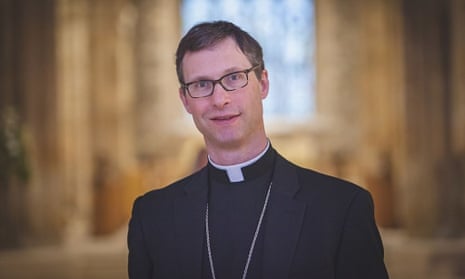A prominent Church of England cleric who is opposed to the ordination of female priests has been appointed as a senior bishop after two earlier attempts were thwarted by protests.
Philip North, the junior bishop of Burnley, was named by Downing St as the next diocesan bishop of Blackburn, with the appointment approved by King Charles. Moves to promote him in 2012 and 2017 failed after vigorous protests by women in the C of E and others over his theological position on female clerics.
North said he was committed to growing the church, being “an ever-stronger voice for justice, especially for the poorest”, and putting children and young people at the heart of the church’s mission.
In a separate statement, he said he was “hugely appreciative of the ministry of my female clergy colleagues”.
Female clergy were “fully and equally part of the diocese”, he said, adding: “As in every C of E diocese, there are provisions in place for an exercise of conscience for those who hold different views on the ordination of women. I delight in the theological breadth that this allows and the diversity of gifts that it releases.”
North does not recognise the theological legitimacy of female priests or bishops, or male priests who have been ordained by a female bishop. He does not ordain women himself although he professes to be in favour of “female leadership” in the church.
In 2017, he was appointed bishop of Sheffield, but decided not to take up the post after protests by many female clergy and other churchgoers in the diocese and in other parts of England. He said it had become clear that “my leadership would not be acceptable to many”.
In 2012, he accepted the post of bishop of Whitby but stepped aside two months later after protests over his opposition to female priests.
After North’s appointment was announced on Tuesday, Women and the Church (Watch), a group that campaigns within the C of E for gender equality, said: “We recognise Bishop Philip’s many gifts and are aware that he has been supportive of women in a range of ministerial posts in the church, some at senior levels.
“Nonetheless, Bishop Philip does not recognise the ordination of women as priests and bishops and will be the first diocesan bishop to be appointed with his theological position on the ordination of women since women were permitted to be bishops in 2014.”
Some female clergy would “struggle to flourish under his oversight”, Watch said. “When parishioners come to understand that their bishop is not personally confident that female priests can undertake priestly roles, such as consecrating the bread and wine, this undermines the authority of their vicar, if she is a woman.”
after newsletter promotion
According to Watch, North is a leading member of the Society of St Wilfrid and St Hilda (SSWSH), a network of clergy who do not share in the Eucharist when it is presided over by any female priest, any male priest ordained by a female bishop, or by any bishop, male or female, who has ordained women.
Rev Martine Oborne, chair of Watch, said: “I find it undermining to explain to members of my congregation that some of my clergy colleagues, including bishops, would not receive bread and wine that I had consecrated.
“This is a heavy burden to carry and makes me feel that I am a second-class priest. And I fear some female clergy with diocesan bishops who don’t recognise their ordinations, no matter how supportive they are, may feel this even more.”
The previous bishop of Blackburn, Julian Henderson, who retired last year, sat in the House of Lords. There are 26 reserved places in the Lords for Anglican bishops.
